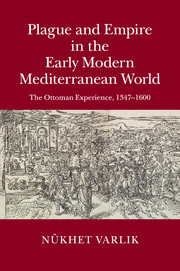Crossref Citations
This Book has been
cited by the following publications. This list is generated based on data provided by Crossref.
2016.
Current Bibliography of the History of Science and Its Cultural Influences, 2016.
Isis,
Vol. 107,
Issue. S1,
p.
i.
Newfield, Timothy P.
2016.
Mysterious and Mortiferous Clouds: The Climate Cooling and Disease Burden of Late Antiquity.
Late Antique Archaeology,
Vol. 12,
Issue. 1,
p.
89.
Jones, Lori
2016.
The Diseased Landscape: Medieval and Early Modern Plaguescapes.
Landscapes,
Vol. 17,
Issue. 2,
p.
108.
Şahin, Kaya
2017.
The Ottoman Empire in the Long Sixteenth Century.
Renaissance Quarterly,
Vol. 70,
Issue. 1,
p.
220.
Mallia‐Milanes, Victor
2017.
Mediterranean Identities - Environment, Society, Culture.
Chouin, Gérard
2018.
Reflections on plague in African history (14th–19th c.).
Afriques,
Namouchi, Amine
Guellil, Meriam
Kersten, Oliver
Hänsch, Stephanie
Ottoni, Claudio
Schmid, Boris V.
Pacciani, Elsa
Quaglia, Luisa
Vermunt, Marco
Bauer, Egil L.
Derrick, Michael
Jensen, Anne Ø.
Kacki, Sacha
Cohn, Samuel K.
Stenseth, Nils C.
and
Bramanti, Barbara
2018.
Integrative approach using
Yersinia pestis
genomes to revisit the historical landscape of plague during the Medieval Period
.
Proceedings of the National Academy of Sciences,
Vol. 115,
Issue. 50,
Cascavilla, Giuseppe Pio
2018.
“L'Aimable Visir”.
French Historical Studies,
Vol. 41,
Issue. 4,
p.
611.
Mordechai, Lee
2018.
Short-term Cataclysmic Events in Premodern Complex Societies.
Human Ecology,
Vol. 46,
Issue. 3,
p.
323.
Borsch, Stuart
and
Sabraa, Tarek
2018.
Refugees of the Black Death: Quantifying rural migration for plague and other environmental disasters.
Annales de démographie historique,
Vol. n° 134,
Issue. 2,
p.
63.
Borovaya, Olga
2018.
The first Ladino travelogue: Moses Almosnino’s treatise on the extremes of Constantinople.
Journal of Medieval Iberian Studies,
Vol. 10,
Issue. 1,
p.
106.
Green, Monica H.
2018.
Putting Africa on the Black Death map: Narratives from genetics and history.
Afriques,
Harper, Kyle
2018.
Integrating the natural sciences and Roman history: Challenges and prospects.
History Compass,
Vol. 16,
Issue. 12,
Mordechai, Lee
Eisenberg, Merle
Newfield, Timothy P.
Izdebski, Adam
Kay, Janet E.
and
Poinar, Hendrik
2019.
The Justinianic Plague: An inconsequential pandemic?.
Proceedings of the National Academy of Sciences,
Vol. 116,
Issue. 51,
p.
25546.
Markiewicz, Christopher
2019.
The Crisis of Kingship in Late Medieval Islam.
Shopov, Aleksandar
2019.
Cities of rice: risiculture and environmental change in the Early Modern Ottoman Balkans.
Levant,
Vol. 51,
Issue. 2,
p.
169.
Coullaut Cordero, Jaime
2019.
Vida y obra de un médico morisco en el exilio: Muḥammad b. Aḥmad b. Abī l-‛Āṣ (ss. XVI-XVII).
Al-Qanṭara,
Vol. 40,
Issue. 1,
p.
73.
Bolaños, Isacar A.
2019.
THE OTTOMANS DURING THE GLOBAL CRISES OF CHOLERA AND PLAGUE: THE VIEW FROM IRAQ AND THE GULF.
International Journal of Middle East Studies,
Vol. 51,
Issue. 4,
p.
603.
MacKay, Ruth
2019.
Life in a Time of Pestilence.
Shafiee, Katayoun
2019.
Science and Technology Studies (STS), modern Middle East History, and the infrastructural turn.
History Compass,
Vol. 17,
Issue. 12,



